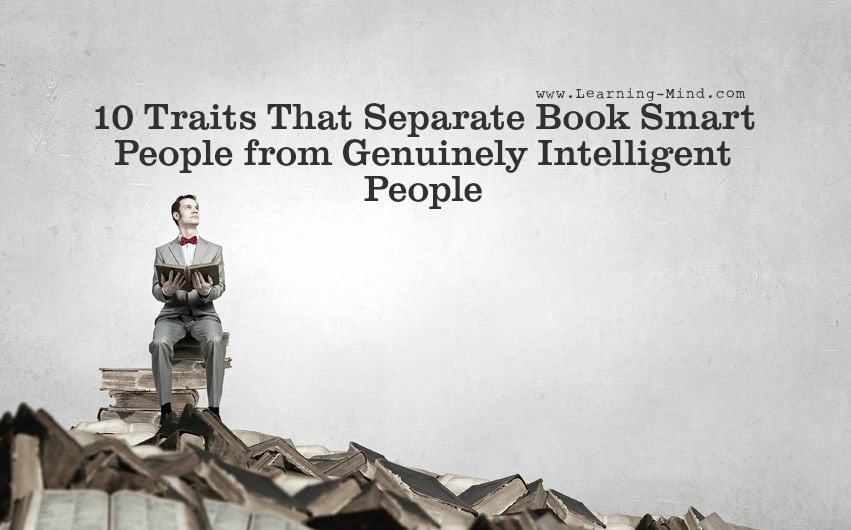
Intelligence is different from learning. Just because someone is not particularly book smart doesn’t mean they are of lower intelligence.
Book smart generally means someone who has had a good education or has chosen to learn independently through educational activities such as reading, documentaries, and courses.
Usually, someone who is book smart is also reasonably intelligent. This is because a certain amount of intelligence is needed to learn and understand. However, if you meet someone who is not book smart, don’t assume they are of lower intelligence.
Many people who have not had such good academic opportunities have high intelligence even though they may not be book smart.
Intelligence is something you are born with. It is a part of your genetic makeup. Your IQ is a measurement of your intelligence and doesn’t change. Your intelligence level can apply to a variety of kinds of intelligence including an ability to do math but also an ability to relate well to others.
Even if you have not had a good education, you can still be intelligent. Conversely, having a high level of education doesn’t necessarily equate with an exceptionally high IQ.
There are also many different types of intelligence. IQ measures only innate intellectual ability (and there are many problems associated with its accuracy) but there are many other forms of intelligence including:
1. Book smart people can list facts and information but they don’t necessarily have a deeper understanding of the subject
2. Book smart people are good at general knowledge and quizzes but may struggle with more complex ideas
3. Intelligent people have a natural ability for something, whether that is math, languages or being good with people
4. Intelligent people tend to use their instincts more to make decisions whereas book smart people rely on tried and tested strategies
5. Book smart people are often educated to a high level
6. Book smart people have often studied hard to achieve their level of knowledge
7. Intelligent people may or may not have been educated to a higher level
8. Intelligent people are often street smart, in that they have learned from their own experiences
9. Intelligent people are usually creative in their use of intelligence, looking for new ways of doing things rather than relying on formulas or methods
10. Intelligent people tend to make up the rules and prefer direct experiences rather than following the rules, ideas, and experiences of others
Of course, intelligent people may also be book smart.
Intelligence and smartness are almost impossible to measure because there are so many different kinds of intelligence. It is also difficult to measure accurately something like intelligence because there are always biases in the tests themselves.
In the end, who really decides what is worth knowing or what intelligence is? Ultimately, we can only make the most of what we have been given and build on our own intelligence the best way we can.
Often, the best way to do that is to get out and experience the world, but we can also learn so much from the people who went before us. Luckily they put that knowledge into books that are available for us all.
View Comments
Actually, your IQ DOES change! You will increase your IQ as long as you study, and do brain stimulating exercises!
Great article! I like the fact that you say there are different kinds of intelligence. I think it would also be fair to say that there are different kind of "book-smarts", if you catch my drift.
I do have to say though, be careful with reading books - without proper scientific data, and just based on experience, then you're only hearing an opinion - which makes complete sense in the domain they are writing about. This has dangerous consequences, even if the authors themselves openly admit that their work is only an opinion based on their experience. I can't speak for every subject matter, but I can say that 100% applies to the world of Software Engineering for sure. So many people quote opinionated books to me which sometimes makes me feel like I need to write my opinions down in a book, based on my experience. In reality, having an alternative opinion would be be adding to the noise and confusion that's already out there in this field... I could be wrong though, seeing as others have gotten away with it!
I REALLY ENJOY READING OR LISTENING TO OPPOSING VIEWS. IT IS EXCITING,
AT TIMES COMICAL OR BEWILDERING BUT WILL OFTEN GIVE TO WIDENING PERSPECTIVES. I DONT LIKE A NARROW FOCUS ON ANYTHING. ITS OK TO DISAGREE. (I'm sorry mom tee-hee)